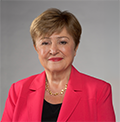Women, Work, and Leadership: One-on-One Conversation with Kristalina Georgieva
IMF SEMINAR EVENT
DATE: October 15, 2019
DAY: Tuesday
03:00 PM - 03:45 PM
LOCATION: IMF HQ1 Meetings Hall A B
Ravi Agrawal, Managing Editor, Foreign Policy Magazine gives us a synopsis of his conversation on gender equality with the IMF’s new Managing Director, Kristalina Georgieva.
Overview
This one-on-one conversation will focus on the macro-criticality of gender equality, including the need to increase the presence of women at the highest levels of decision-making, and how to address barriers to women’s career growth, such as unpaid work and how it influences women’s decisions to enter the labor market.
This event is hosted in conjunction with Her Power, an inaugural global women's summit hosted by Foreign Policy in collaboration with IMF and the OAS.
Join the conversation via #IMFGender #GenderEquality #HerPower2019
Women, Work, and Leadership: One-on-One Conversation with Kristalina Georgieva
In a one-on-one conversation with Ravi Agrawal from the Foreign Policy Magazine, Managing Director of the IMF, Kristalina Georgieva, talked about how improved gender parity would lead to better economic outcomes for all, and what the IMF can do to help.
Key Points:
- The role of the Fund. Georgieva argued that the IMF has a role in bringing forward analytical work on the effects of gender inequality. IMF research shows that countries cannot fully prosper without tapping into all its talent. For example, Sweden’s GDP would be 4 percent higher if women fully participated in the economy on equal terms, and in Senegal GDP would be 8 percent higher. She also added that research shows that companies are more profitable when they have more women on their boards, because diverse teams contribute to better decisions.
- Unpaid work. In her first blog on imf.org, Georgieva cited recent IMF analytical work which shows that if unpaid work was counted, global GDP would increase by 35-40 percent. Women do more unpaid work than men, on average 2.5 hours more per day. However, the margin differs significantly across countries: in Norway, women do 20 percent more work, in Japan it is 380 percent, in Pakistan as much as 1000 percent. The unequal distribution of unpaid work is not only unfair, it is also inefficient since you have high-skilled women doing unskilled work.
- How to promote change. Georgieva stressed that while political will is needed to take concrete steps, cultures take time to change. As an example of concrete action, she mentioned India where measures had been taken to improve transit security for women, thus allowing more women to go to work. Other practical measures include taxation that favors female labor force participation and child care provision. In response to a question on what men can do to help, Georgieva said that it is important that men recognize the historical injustice and that we now are working to correct it. When asked by a participant in the audience about legislation of quotas of women in boards, she spoke in favor of quotas, noting that while they are not a perfect solution, they constitute a practical means to achieve concrete change.
Panelists

Ravi Agrawal is the managing editor of Foreign Policy. Before joining FP, Agrawal worked at CNN for more than a decade, including his most recent position as the network’s New Delhi bureau chief and correspondent. Previously, he served as a senior producer in CNN’s New York and London bureaus, receiving a Peabody Award and three Emmy nominations for his work. Agrawal is the author of India Connected: How the Smartphone Is Transforming the World’s Largest Democracy. He is a graduate of Harvard University.



